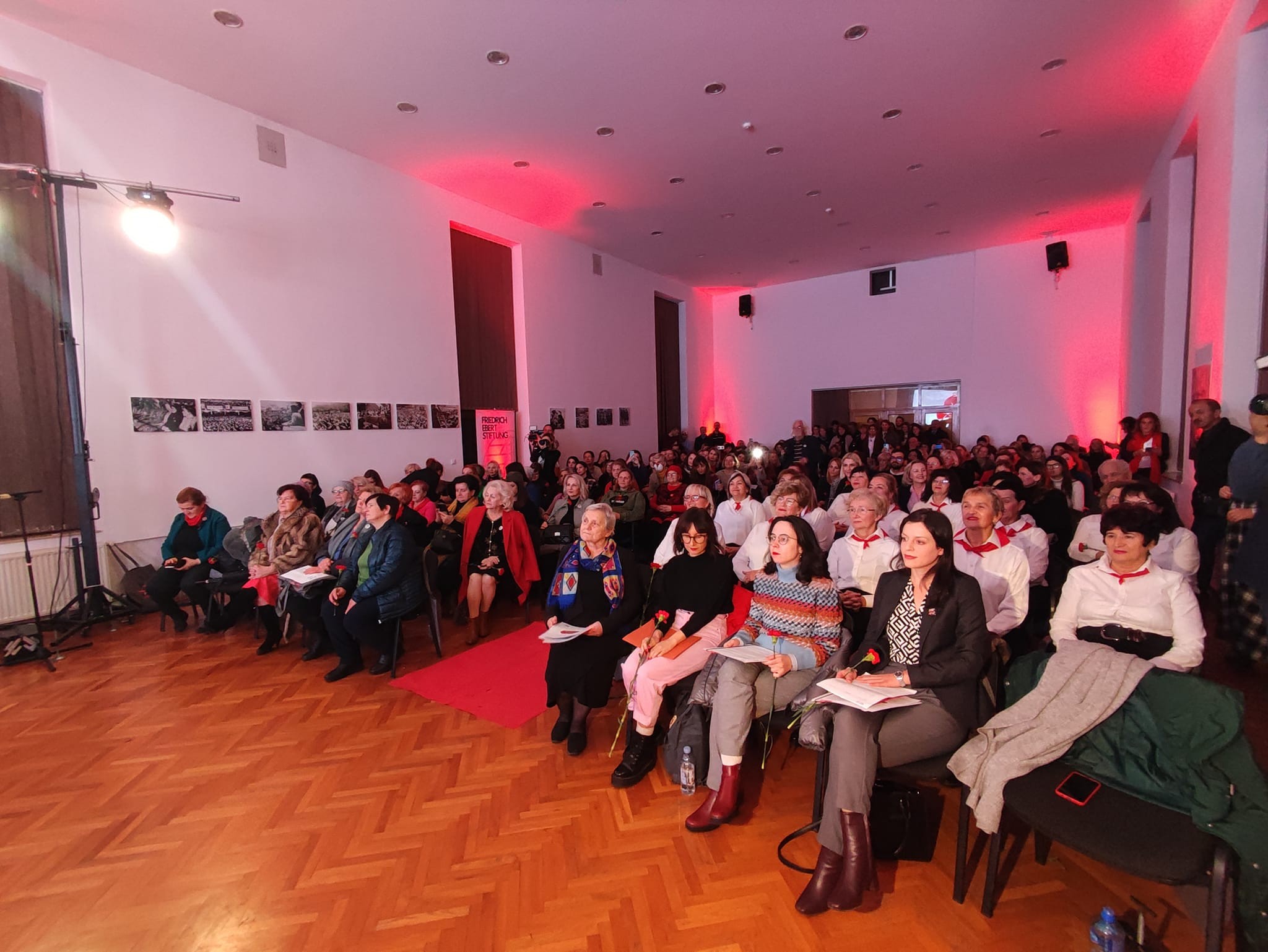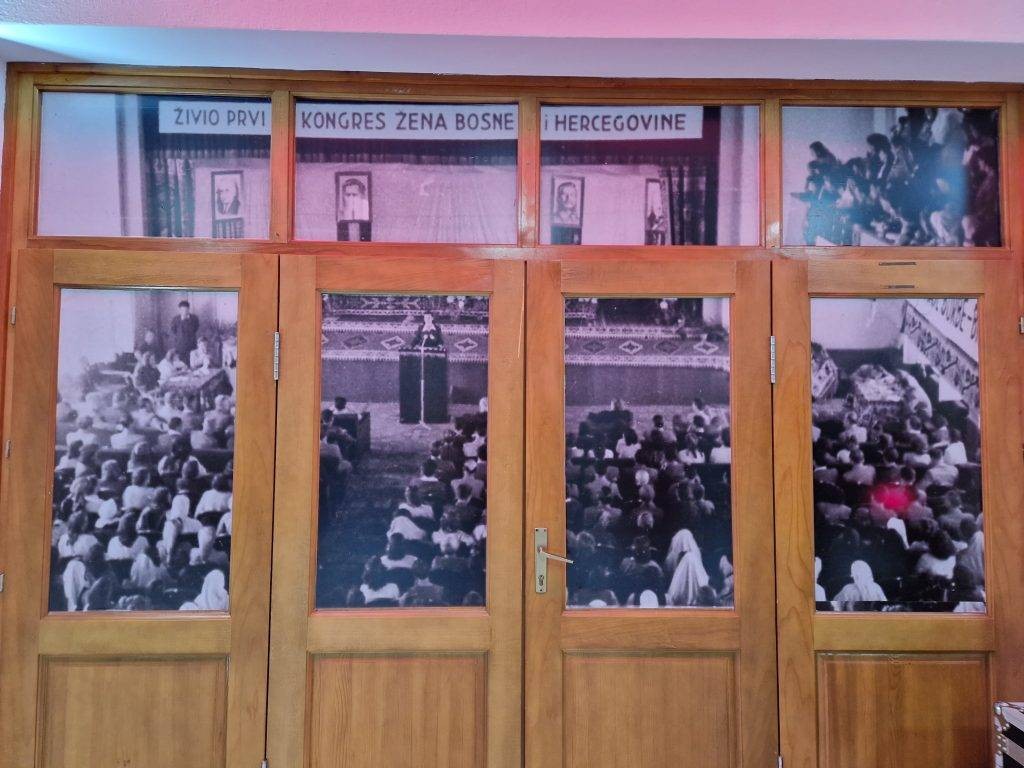
December 6, 2022, Bosanski Petrovac
The simple and strict historical narrative of women in the 20th century is "woven" from two threads: of labor and wars. Mass employment in industrial production, the two world wars and the communist revolution irrevocably changed social roles in private and public space. In the political space, women's movements for equality and economic emancipation built ideological platforms that intertwined with nation and state building in the 20th century. The participation of the female population in the revolutionary, national and guerilla movements during the Second World War represent the basic polygons of female participation in the creation of the political history of the world, and at the same time they represent a fascinating story of the human struggle and the need for a civilizational leap forward.

And women from Macedonia through the organized anti-fascist movement "became part of history". That process was finalized during World War II. In the extensive documentary collection from 1976 on the participation of women in the NOB, there are 5,752 biographical notes of female partisans; 141 women from Macedonia bear the recognition "Partisan Monument 1941"; and 7 women were declared national heroes: Mara Naceva, Olivera Jocic-Vera, Ibe Palikuca, Estreja Ovadia-Mara, Elpida Karamandi, Vera Aceva, Fana Kochovska.
I have mentioned the documentation and historical sources that document this important human story. And about the importance of documents and sources from the history of women in the post-Yugoslav space, as well as about the danger and consequences of losing the archives of women's lived experience, I would like to share with you an example from our contemporary experience as activists, historians of our community and chroniclers of past and present struggles. In that context, nothing summarizes the situation on the ground, the situation in our institutions and schools better than the position of the documents created by and for the social work of AFZ, i.e. the state of their oblivion of their fading into the jaws of oblivion.

During the past year, together with the Macedonian activist Jana Kocevska, we started an extensive research and activist process dedicated to the memory and history of the first Macedonian women's magazine "Macedonka - Organ of AFZ". The experiences from that work of ours, especially their consequences in the area of politics of memory, I think it is important to share them here.
As a historical source, this press was part of the sources of scientific literature from the young Macedonian historiography, in the form of published archival collections, which for the first time demystified the image of the Macedonian woman as an impersonal and nameless part of history. The broader goal was to finally bring women to the forefront of national historiography, as equal participants in the creation of statehood – a solid guarantee for the future of their political, social and economic rights acquired in the recent past. The language of the AFZ in the magazine, in which they spoke and wrote about the political involvement of women, was composed of several formulas: "political elevation", "equality", "emancipation", "liberation of women", "removing the darkness from the eyes" and " humanization of gender relations'.
When we are faced with a source from the history of AFZ, on the one hand we are overwhelmed by the epistemological and cultural potentials, but as soon as we approach the source from a research point of view, the main need arises to fill the gaps related to the specific conditions, context and network of persons who were involved in the realization of this important documentation. The state of "factographic deficit", ie. the lack of a wider historiographic ground on which to perform a theoretical articulation of any further critical analysis, clearly indicates that the magazines, archives and other heritage of the history of AFZ, today primarily represents a source shrouded in oblivion. Therefore, the first question we asked ourselves when reviewing the position of the magazine "Macedonka", as well as in the politics of memory, was: why there is no interest, within the national institutions, for the rare remains of women's history, where the critical approach and gender perspective would be considered productive? A brief overview of the main features of the representation of the magazine "Macedonka" in the official narrative, as well as in the culture of memory, may help us in giving an answer.

Namely, already in 1952 AFZ of Yugoslavia and the successor organization – SDZ of Yugoslavia, at the central and local level, started to create their own archive. It was about a decision to start collecting documentation, sources, testimonies and memoir documents about the participation of women in the NOB. This material was later to be archivally systematized, but professional monographs were also to emerge from it. At the republic level, in Macedonia, that process began only in 1963 by the employees of the Institute of National History and ended in 1976, with the publication of the Collection of Documents by the authors Vera Vesković-Vangeli and Marija Jovanović. Until the end of the 20th century, this documentation was used as a source in a scholarly and commemorative function in the formalized socialist culture of remembrance.

After the change of the system in 1991, the magazine began to be forgotten in a double sense: both as part of the periodical culture and as a historical source. It could be said that the memory of the magazine existed in mnemonic corners, like the organizations that emerged from the Union of Fighters of the NOB as maintainers of the anti-fascist tradition; or in the work of individual researchers from the academic milieu. This crisis of the women's archive in post-Yugoslav societies points to the conclusion that the exclusion of women from the sphere of power and (politically relevant) knowledge is the best evidence of an autocratic, controversial, unfinished modernization. In fact, one devastating consequence of the oblivion in this case is the loss of the connection between the values of AFZ of a political, cultural and economic nature, with modern concepts of gender equality. Today, more and more often, the path of women's emancipation is "taken for granted", i.e. the subhuman position of women just a century ago is forgotten. Here we must fully agree with the idea that historical memory is a prerequisite for creating strategies for social change in the present moment.

At the end of our work with the important sources for AFZ at the republican and local Macedonian level, a valuable collection of academic texts emerged, the first since the 1970s, as well as the realization of our efforts for digital and free availability of this important source. We, as activists and as professionals in the field of relevant sciences, must approach a broad activity to encourage the institutions in charge of keeping this archival heritage to solve the problems of forgetting. In doing so, we must seek an approach that highlights the most important aspect of this legacy: its centrality to women's lived experience that offers different narratives in our societies, often poisoned by nationalism and reaction to palanquin practices. By conserving women's lived experience, we create a "women's archive", where the community is constantly reminded of its significance.

And finally, my friends, demands for equality often mean challenging established hierarchies. Thus, while the forms of feminism and its actions are constantly changing and advancing, the reaction remains the same and can be compared to that of the 19th century, to that of the mid-20th century, and to that of 10 years ago. It is a lazy, populist and quasi-egalitarian sentiment that "feminism is not for poor countries", that we are still "not at that level to deal with gender aspects", etc. What I perceive from a historical perspective is that feminism in our country has developed a very significant function for the progress of society, and that is establishing the practice that struggles are conducted simultaneously and on multiple fronts, for different groups of individuals and communities. And it is precisely that point in the development of feminism in our societies that leads directly to the work and practices of AFZ.

